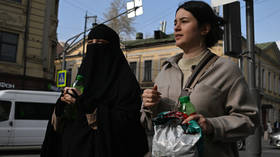Russian human rights official calls for ban on Muslim face coverings

The head of Russia’s Human Rights Council, Valery Fadeev, has said the government should consider a ban on wearing niqabs, a traditional Muslim veil that covers the entire face apart from the eyes.
The official voiced the proposal in an interview with the Parlamentskaya Gazeta newspaper published on Monday, which focused on the risks of extremism in multi-ethnic society.
Fadeev noted that wearing face coverings is banned in several countries in Central Asia, adding that he is planning to discuss potential measures in Russia with representatives of the Muslim community, as well as to raise the issue at a regional level.
“First of all, I’d like to outline my position: I think niqabs should be banned in Russia,” the human rights chief said.
Last year, Uzbekistan tightened legislation that bans wearing the niqab or burqas in public, citing security concerns. Kazakhstan’s Ministry of Culture said it could adopt similar measures, after already prohibiting hijab headscarves in schools. Meanwhile, Kyrgyzstan has proposed fines for women wearing Islamic niqabs and men with bushy beards.
Fadeev’s proposal has met with a mixed response. The head of the State Duma’s Labor Committee, Yaroslav Nilov, told RTVI that any such measures should be discussed behind closed doors with representatives of Muslim groups and local authorities, without widespread media coverage.
Russian MP Ildar Gilmutdinov has argued that a radical ban on wearing niqabs would worsen the situation, and that discussions should be conducted via religious organizations and federal agencies.
Eva Merkacheva, a member of Russia’s Presidential Human Rights Council, has supported Fadeev’s initiative, noting that the European Court of Human Rights upheld a ban on wearing the burqa and full-face niqab veil in public, after it was introduced by several EU states nearly a decade ago.












